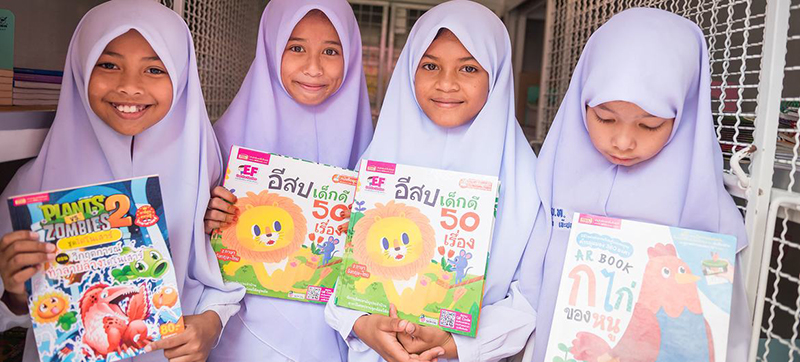 Mother Language Day
Mother Language Day
Celebrating the world’s rich ‘linguistic tapestry’, UN officials call for realizing multilingual education on Mother Language Day
New York: Multilingual education is a critical key to razing inequalities and promoting human rights for all, UN officials said on Tuesday to mark International Mother Language Day.
Commemorating the world’s languages – all 6,700 of them – since 1999, the Day aims at celebrating ways of showcasing the world’s linguistic tapestry, committing to the preservation of the diversity of languages as a common heritage, and working for quality education – in mother tongues – for all, said Audrey Azoulay, Director-General of the UN Educational, Scientific and Cultural Organization (UNESCO).
The theme this year - “Multilingual education – a necessity to transform education” - aligns with recommendations made during the UN Transforming Education Summit in 2021. Convened by UN Secretary-General António Guterres, the gathering drew attention to indigenous people’s education and languages.
Africa has highest linguistic diversity
The day also highlights shortcomings and challenges ahead. UNESCO’s recent report, Born To Learn, shows that at most one in five children are taught in their mother tongue in Africa, the continent with the highest linguistic diversity. At the same time, 40 per cent of the world’s students do not have access to education in the language they speak or understand best.
This severely undermines learning, cultural expression and the building of social relations, and significantly weakens the linguistic heritage of humanity, Ms. Azoulay said.
“It is therefore crucial that this language issue be taken into account in the necessary exercise of transforming education,” she said. Moving forward, better data collection is required for improved tailored action, she said.
Diversity’s ‘fragile value’
“Above all, however, it requires a more general awareness of the irreplaceable but fragile value of the world's linguistic and cultural diversity,” she said. “Each of the more than 7,000 languages spoken by humanity carries within it a unique view of the world, of things and of beings, a way of thinking and feeling – so much so that each disappearance of a language constitutes an irretrievable loss.”.
Progress is being made. UNESCO is leading the International Decade of Indigenous Languages (2022–2032), an important opportunity for the world to mobilize in order to safeguard a major part of its cultural diversity. There is also a growing understanding of the importance of multilingual education, particularly in early schooling.
Keys to inclusion
Yet, States must be more inclusive in the treatment and use of minority and indigenous languages, said Fernand de Varennes, the UN Special Rapporteur on minority issues.
“In celebrating the richness and beauty of the global linguistic tapestry, it is essential to move away from new forms of nationalist majoritarianism that assume that societies and States should have only one language to the exclusion of all others,” he said.
This is inconsistent with inclusive societies that respect the human rights of linguistic minorities and indigenous peoples, he said.
“Languages are essential tools to communicate and share knowledge, memory, and history, but they are also key to full and equal participation,” he said. “One of the most effective ways of empowering minorities and indigenous peoples is to guarantee the use of their language in education.”
Adopting an inclusive approach is the most effective way of guaranteeing equality and non-discrimination with respect to international law and will ensure that minority and indigenous children are provided with useful literacy and numeracy skills to learn other languages, he said.
Rather than reducing or even eliminating the use of minority and indigenous languages in education, he said States should invest in the development of teaching materials, training and promoting the mother tongue as a medium of instruction.
‘Untranslatable’
Meanwhile, around the world, the UN has been commemorating the day, in many, many languages. Bangladesh and partners will host a meeting at UN Headquarters, and UNESCO held an event in France.
To mark the day, Mexico, UNESCO and partners are highlighting their “Untranslatable” project, book and graphic exhibit. Shaped by 68 words from 33 indigenous languages, the exhibit will travel across the country, and the book, published in 2021, is now available free on the website of the National Institute of Indigenous Languages (Inali).
Zapotec poet Irma Pineda, a partner in the project, said the goal was to promote interest and respect for the cultural and linguistic richness of Mexico.
It was also “for people to know that we don’t speak only Spanish, but rather 364 linguistic variants of 68 languages, and that each word of this project reflects a whole worldview and a way of thinking of many indigenous people,” she said.
Support Our Journalism
We cannot do without you.. your contribution supports unbiased journalism
IBNS is not driven by any ism- not wokeism, not racism, not skewed secularism, not hyper right-wing or left liberal ideals, nor by any hardline religious beliefs or hyper nationalism. We want to serve you good old objective news, as they are. We do not judge or preach. We let people decide for themselves. We only try to present factual and well-sourced news.







